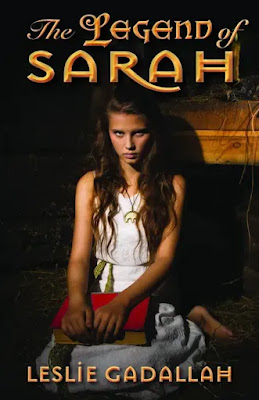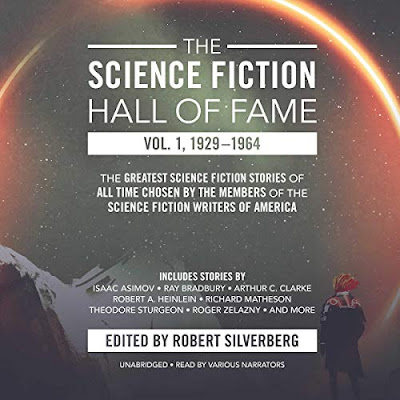My speculative flash fiction, "Day Three", has been selected for inclusion in The Best of Metastellar Year 1, released today (July 29, 2022). The story originally appeared in Pulp Fiction #21, 2019, and was reprinted online Sept 3, 2021 by Metastellar. A bit of a departure from my normal style, very pleased by the validation of it's being reprinted and anthologized.
Friday, July 29, 2022
Monday, July 18, 2022
Leslie Gadallah and Canadian Space Opera
My essay, "Leslie Gadallah and Canadian Space Opera" has been reprinted on the Shadowpaw Press website to correspond with the re-release of Gadallah's The Legend of Sara.
I am incredibly happy to see the Legend of Sara back in print for the third time (after Five Rivers closed shop) as it is one of my all-time favourite Canadian SF novels. My essay was originally the Afterword in the Five Rivers edition, so contains spoilers--no reading it before the book! If you haven't read the book yet, go buy it! You won't be disappointed.
Thursday, July 7, 2022
"Grandfather's Birthday Barbeque" published for third time
My short story "Grandfather's Birthday Barbeque" has been published in Siren's Call #58 Summer 2022.
The story is based on a real incident in my life, though of course taken one step further into horror. I think it came out okay... Siren's Call is available for free download.
The story previously appeared in Potatoe Soup Journal and The Best of Potato Soup Journal 2020.
Tuesday, July 5, 2022
Science Fiction Hall of Fame (Early SF)
I am listening to The Science Fiction Hall of Fame, Volume One 1929-1964: The Greatest Science Fiction Stories of All Time Chosen by the Members of the Science Fiction Writers of America (which was on sale on Chirp). I like listening to audiobooks while I do household chores, both because chores are less boring when listening to something and because keeping focused on the audio stops me thinking "Who made this mess!" or "Why am I the only one who ever changes the toilet roll?" or other negative thoughts, unsuitable to productive parenting or viable marriages. Anyway, I'm still working my way from the earliest stories through WWII and have several observations about this early era of SF:
- Having read all these stories as I was growing up in 1950s and 60s, I was surprised to find that my memory of them is mostly wrong. I usually get the underlying concept correct, but a lot of the details are not at all as I thought I recalled them. I appear to have edited them in my memory to make them better than they were.
- SF really did just focus on ideas back in the day, with almost no thought to character development. All the stories so far have been about exploring some technology or concept, as in Pagett's (Henry Kuttner & C. L. Moore) exploration of alternative paradigms.
- The focus on ideas often means the writing is truly unwieldy: long expository lumps that interrupt the narrative to provides a voice-over narration of the technology or future history or whatever. These really appalling examples of 'info dump' would absolutely not pass any editor today.
- The (now) completely wrong science is far less annoying than the gross sexism/racism/classism (of which I was apparently entirely unaware in my youth). All of the stories are nearly unreadable today in their naivety and stereotyping. The sexism / acceptable roles for women, for example, is actively painful when the story is supposedly set in our future. In Lester del Rey's "Helen O'Loy", for example, the depiction of Helen's role as a dependent and subservient housewife would be cringe-worthy even to the most conservative Evangelicals today. The racism is less obvious, being mostly a case of omission: the universe projected by these writers consists entirely of middle-class white males. How could authors imagine mars colonies and casual spaceflight, but have no sense that social relations might change?
- The vocabulary, even in the lowest pulp magazine examples (like Heinlein's "The Roads Must Roll"), is significantly higher than most modern SF. Henry Kuttner & C. L Moore expected readers to have vocabularies that would be unfamiliar to many of my undergradate students. It's astonishing!
[I see this as a result of many larger publishers enforcing ‘controlled vocabulary’ on YA writers, so that they can reach the lowest common denominator of the market place. But if YA readers don’t get to stretch their vocabulary, then adult books soon follow to avoid being labelled a ‘difficult read’ in a sad downward spiral]
- I should add that I've also been listening to Lost Sci-Fi a collection of non-famous early SF by various authors (again from Chirp), and these 'forgotten' pulp era stories are perhaps more typical of the genre of the time. In addition to the above characteristics, they all share a "goshwow!" style, delivered by the narrators as if every line ended in an exclamation point. The closest thing I can compare the audio versions to is a K-Tel commercial. “But Wait! There's More!”
Speculative Fiction has come a long way from its pulp roots nearly a hundred years ago. None of these "greatest SF stories" could likely compete today. Listening to hem is nostalgic and fascinating but...not that great. (Which makes me wonder if those authors nominating stories for this Hall of Fame collection had re-read them, or if their recollections were as inaccurate as mine had been.)
Part of me regrets that I wasn’t an adult in the pulp era, as I think I could have competed in that market. There are so many more voices and so many better ones working in the genre today, it’s hard to believe I have anything to contribute.
Which calls to mind when I was a slush reader for Tesseract Books when it was part of the Books Collective (i.e., before Edge). An elderly author who clearly grew up in the pulp era submitted a perfect 1930’s SF novel which we had to reject. Had he submitted it to a pulp magazine in 1936, I’m sure it would have been a hit. But by the 1990s, it was unpublishable. The twelve-page exposition of how a warp drives works told by the male scientist hero to the blonde I’m-only-in-the-story-so-he-has-someone-to-explain-to female was simply a non-starter. So… I greatly fear my style is correspondingly stuck in 1960s-style SF. Had I finished my novel in 1971 (when I started it), I am confident I could have managed an Ace Double level of writing. In 2022…I don’t know if I’m even in the ballpark. Modern speculative fiction is more meaning- and character-driven, more diverse, more everything—except for vocabulary.




